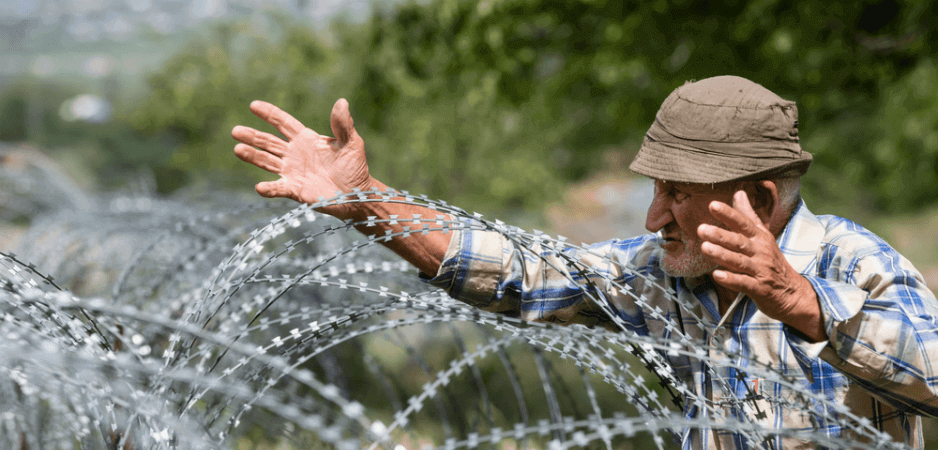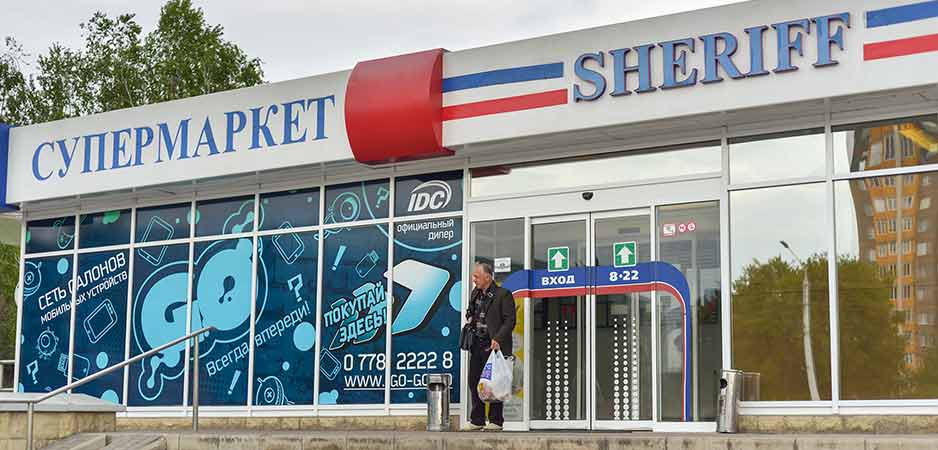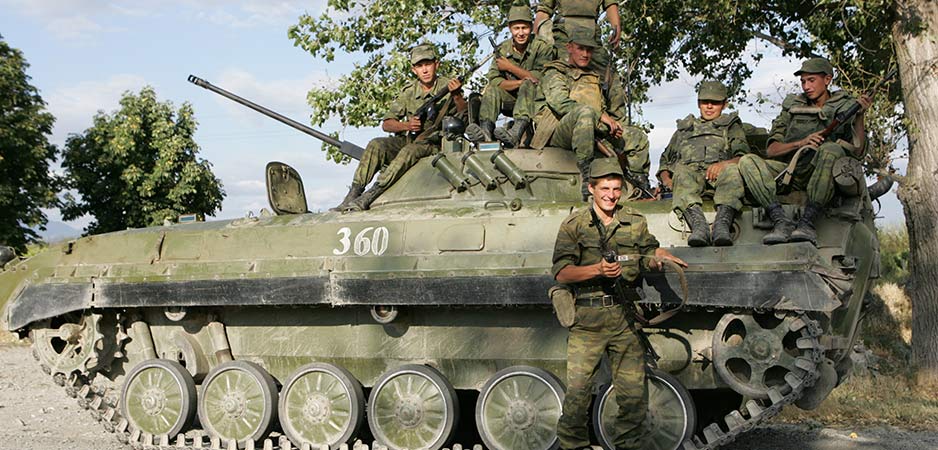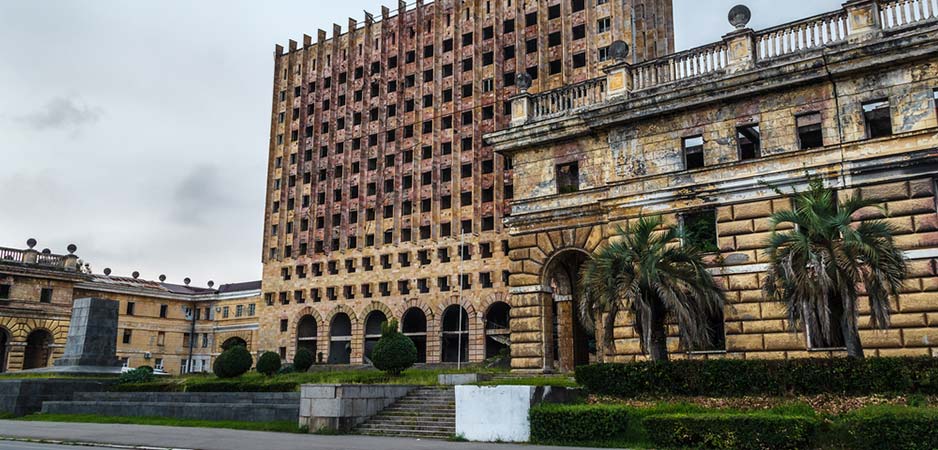The South Caucasus must shift away from geopolitical antagonism and focus on productive developments that leave questions of political legitimacy for later.
The Syrian government’s recognition of independence of the de facto republics of Abkhazia and South Ossetia was predictable. It is widely considered to be an appreciative act toward the Russian intervention that facilitated Bashar al-Assad’s continued rule. Universal condemnation by the United States, its global allies and international organizations was expected as well. Each entity demands peaceful resolution to post-Soviet frozen conflicts and identified Kremlin manipulation at the core of the inert diplomatic process.
The Syrian announcement is considered politically insignificant, but it demonstrates the lack of opportunities available to quasi-independent states when the international community eschews their reality and condemns their patrons. It is an additional reminder that the dramatics of the South Caucasus must shift away from geopolitical antagonism and focus on productive developments that leave questions of political legitimacy for later. Ongoing events surrounding a trade corridor in South Ossetia demonstrate this predicament.
Georgian influence in South Ossetia has continued to fade since the 2008 Russo-Georgian War. Allegations of ethnic cleansing and lack of viable economic opportunities mean few ethnic Georgians remain in the territory. A 2016 census revealed that though the population of South Ossetia tallied at 53,532, only 3,966 Georgians, or 7% of the total population, remained. Subsequently, the education system is in the process of transitioning the primary language of instruction to Russian. On April 9, 2017, a majority of South Ossetians voted in a referendum to alter the territory’s name to South Ossetia-Alania to pair with the neighboring Russian federal subject, North Ossetia-Alania. Shifts in demographics, a complex history and loyalties present challenging barriers to outright resolutions.
A second impediment to South Ossetian independence and reintegration with Georgia is a deep merging with Russian interests. The appearance of political leadership in the Russian protectorate exhibits more indigenous roots, but entrenched links and reliance upon Moscow remain. A nascent political culture emerged with the development of political parties, yet any opposition remains fundamentally pro-Russian. This was demonstrated in the 2017 presidential elections when United Ossetia candidate Anatoly Bibilov defeated Kremlin-backed incumbent Leonid Tibilov. Both espouse the incorporation of South Ossetia into the Russian Federation despite being political opponents. Legislators in the de facto republic engage in politicking over universal topics such as inherent corruption and economic stagnation, but belief in Russia as their guarantor of security is fundamental.
Taking Direction from Legislation
Moscow engages more explicitly in Tskhinvali than Sukhumi, although both signed important integration treaties with the Russian Federation. The 2016 Treaty on the State Border with Russia resulted in strictly demarcated Russo-South Ossetian boundaries. Such an accord expresses a veneer of preserving South Ossetian independence since recognized frontiers represent physical division between Russia and the Georgian territories. Conversely, the purpose of this Russian regional tactic is to deepen a frozen conflict, while at the same time stifle the internationally condemned discourse surrounding annexation.
The 2015 Agreement Between the Russian Federation and Republic of South Ossetia on Alliance and Integration accentuated South Ossetia’s role as a client state. It ensured South Ossetia’s reliance on outside security, sustained a sluggish political culture and perpetuated allegations of impeding annexation. Long-term strategic interests, primarily the Russification of the breakaway Georgian territory, dominated the 25-year pact. Simplifying the process to acquire Russian citizenship may be the simplest part, but the integration of South Ossetian army units into the Russian armed forces ensures that questions of national security and quasi-territorial integrity remain firmly under Moscow’s direction.
It is rather unfeasible to imagine Russian interests leaving the breakaway region with such a formal, yet internationally criticized, agreement. As a result, the US State Department requests for Russia to remove its military installations from South Ossetia are moot. Bibilov noted that such an occurrence is non-negotiable due to the elaborate joint security apparatus currently in place.
Further, the formal economic integration of South Ossetia into the general Russian budget, as expressed in the 2015 agreement, maintains reliance upon Russia for financial aid and as sole trading partner. South Ossetia may be steadfast in its claim of independence, but it resigned management of its trade and customs to Moscow. A lack of international recognition and administrative inexperience in these areas necessitate the current political arrangement with Russian officials. Additionally, Russia assumed direct obligations to assist Tskhinvali in the payment of government salaries and an increase in pensions to residents. Any financial incentives are extremely persuasive for a separatist state of modest means and further uphold the dominant belief that Russia is the guarantor of autonomy from Georgia.
South Ossetia finds itself in a dilemma. A voluntary abnegation of its independence is unlikely, and its fundamental alliance with Russia assures political security. Nonetheless, its mountainous geography provides few natural resources for export and few concrete economic development prospects. International sanctions and contractions in the Russian economy resulted in decreased aid. Subsequent devaluation of the ruble instigated higher priced Russian imports inaccessible for average South Ossetians.
This culmination of variables boosts the exploration of any prospects that could result in a reduction of allocated subsidies and raises queries into de facto state financial security overall. Trade is a tolerable issue that can be independent from questions of autonomy.
An Active Shadow Economy
Shadow markets are traditional consequences of circumstances that proscribe licit and public trading of goods. Legal barriers rarely avert cross-border exchanges and grey areas of legitimacy especially validate this scenario. These conditions, fueled by necessity and incentives to earn, are conducive to fomenting corruption. In a nutshell, these are some obstacles and concerns that describe the economic situation in South Ossetia.
Trade between Georgia and its breakaway regions continues throughout their ongoing declarations of independence. Observers at the International Crisis Group documented constant commercial interactions at the Georgian-South Ossetian border and an increase of trade since disruptions in the Russian economy. Growth of this informal system evolved even though the 2008 Georgian Law on Occupied Territories prohibits overt trade, and similar regulations in South Ossetia exist.
The 2008 law created severe bureaucratic impediments primarily because country of origin customs declarations are deemed illegitimate. If an enterprise pursued entrepreneurial ventures in the separatist republics, they would have to seek approval from Georgian authorities, which has not typically been done. Layers of bureaucracy and condemnation of political status prevent international interests from investing in the quasi-independent state, but it has minimal effect on regional cross-border trade. Location on a viable trade route coupled with independence claims indicates the South Caucasian shadow economy is ripe for expansion. It is up to the power brokers of the frozen conflict — Russia and Georgia, along with the territories — to envision a strategy that utilizes trade as a tool for their distinct interests.
Options for Economic Growth
The collection of tariffs, as well as the knowledge of administrative processes to do so, presented important deterrents to the regularization of trade between Georgia and the quasi-independent republics. Both elements offer legitimacy to claims of statehood and agreement to such arrangements counter Tbilisi’s ambition of reunification. At the current stage, a strategy of outright reintegration is futile as little diplomatic energy has been directed toward this particular impasse, the breakaway regions are reluctant to renounce their sovereignty and Russian interests are deeply interwoven into their constitutions. Discourse concentrated on questions of legitimacy and state integrity — and each player pursuing divergent gains — usually results in political stand-offs. Trade offers constructive conduits between Georgia, Russia and its protectorates.
In his 2009 speech to the Georgian parliament, former US Vice President Joe Biden stated that prosperity and peace are at the core of future Georgian territorial integrity. A healthy economy and financial growth are more attractive to Abkhazians and South Ossetians than their current arrangements with Russia. In April 2018, Tbilisi announced the Step Toward a Better Future — a set of reunification policies focused on engagements with Sukhumi and Tskhinvali in the areas of humanitarian aid, free movement and easing of trade barriers. Economic perks included status-neutral labeling on exports, investments in entrepreneurship and access to European Union markets. While appealing, the protocol was quickly dismissed by South Ossetian authorities who perceived it as yet another unfeasible and predictable approach from Tbilisi.
The dismissal of the Step Toward a Better Future demonstrated the continual shirking of Georgian offers, and the Kremlin’s role is easily surmised. Moscow remains suspicious of dialogue between its protectorates and Georgian lawmakers. However, trade is an acceptable matter that offers assistance in financing the republics. Russia retains all the important levers of power as well as the dominant trade negotiator, since they were allocated that role in the 2015 integration agreement.
Nonetheless, it is tactically flawed to link intriguing economic incentives with the vehement rhetoric surrounding any topics of reunification or sovereignty. Any frank offers face rejection simply because South Ossetia is steadfast in its autonomous position. Discussions over trade opportunities removed from debates over long-term Georgian territorial integrity provide a more constructive approach to negotiations between the Russian Federation and Georgia as well as compliance by the Russian patrons in Tskhinvali.
Demand for New Trade Corridors
Debate over establishing trade corridors that traverse through separatist regions highlight the issues inherent in state legitimacy and trade. While three passageways are proposed, for the sake of concise analysis, the route that crosses South Ossetia is the focus here.
As noted, the Russian protectorate has little natural resources or sources of intrinsic economic development. The collection of customs fees is an insufficient source of funding for the entirety of the South Ossetian budget, but they provide an important source of independent revenue. Tskhinvali secures fees from the newly established Razdakhan checkpoint already. Further, being a passageway for the transportation of goods offers the prospect of creating partnerships with other regional neighbors, such as Armenia. Russia and Armenia promoted a north-south route through Ossetian territory so that their reciprocal trade is accelerated and streamlined. A lack of political legitimacy meant that any beneficial projects involving South Ossetia were placed on indefinite hold.
Necessity triggered the resumption of previously strained diplomatic channels. This was only possible once the overwhelming subjects of Georgian reunification and Russian patronage took a backseat to the benefits of facilitating commerce.
Currently, the only acceptable route is the Upper Lars corridor on the Georgian Military Highway, but it presents a unique set of problems. Political disputes between Russia and Georgia resulted in closure of the border crossing for almost seven years. Yerevan lobbied Moscow to reopen the checkpoint so that the free flow of trade between the two could resume unimpeded. Russian restrictions remain and as a result, the timeworn passageway has a serious problem with congestion.
Natural disasters such as landslides, avalanches and snowstorms also hamper the smooth transportation of goods. These impediments and increased north to south trade pressed the need for construction of secondary routes. The most logistically and fiscally convenient route proceeds along the Transcaucasian Highway through the Roki Tunnel, the geographical point of connection between North Ossetia-Alania and its separatist neighbor. It would then continue through Tskhinvali and onward to the Georgian city of Gori.
Deliberations over trade corridors stalled because matters of state legitimacy dominated negotiations. Concern over the optics of a de facto state managing passport controls and subsequent administrative procedures alarmed Georgia. All the while, demand for routes to expedite regional trade and the strengthening of an informal economy demonstrated that political status was secondary to economic ventures in the Caucasus. Necessity triggered the resumption of previously strained diplomatic channels. This was only possible once the overwhelming subjects of Georgian reunification and Russian patronage took a backseat to the benefits of facilitating commerce.
A Third-Party Solution
The impasse over administrative obligations at the disputed borders required nuanced navigation. An established balance of power in the region would be disturbed if key participants — Russia or Georgia — appropriated these roles. Additionally, Russia faced strong international disapproval for exercising further jurisdiction over South Ossetian interests. States or international organizations are unviable as neutral third parties since the majority of the global community unambiguously backs Georgia. As a result, a corporate and non-politically aligned resolution makes the most sense and contravenes diplomatic deadlocks over lawful statehood.
The old adage that “politics is about who gets what, when and how” succinctly describes the tactful process that initiated a viable third-party solution to the South Caucasian trade gridlock. A lack of amenable diplomatic relations between Russia and Georgia at the highest levels left this issue unsolved. However, political opportunity offers convenient prospects through discourse. Questions concerning Georgian legal status and border checkpoints in the separatist territories caused a major impediment to Russia’s eventual 2012 WTO membership. It was politically expedient for Tbilisi to advance its position as it resulted in a continuous series of diplomatic talks to mutually resolve the issue. In the South Ossetian case, this centered on passageway through the Roki Tunnel.
#Assad receives President of South #Ossetia Anatoly Bibilov who is in #Syria for 3 day visit. President #Bibilov thanks Syria for recognizing South Ossetia and his support and solidarity for Syria. Treaty of friendship and cooperation was signed between the countries pic.twitter.com/C8ovXydILI
— SMM Syria (@smmsyria) July 24, 2018
Georgia stipulated Swiss-meditated discussions and the 2011 Agreement on the Basic Principles of the Mechanism of Customs Administration and Trade Monitoring resulted from these talks. Swiss multinational firm SGS S.A. emerged as the practical third party capable of managing the logistical barriers that prevented the regularization of trade with the South Caucasian separatist republics. The highly-respected company has extensive experience in monitoring the inspection and transportation of goods, adherence to regulatory standards and trade protocols established by foreign governments.
In the case of the Georgian territories, SGS will be tasked with administrative procedures, such as the collection of duties and passport controls as well as gathering data on passing cargo. This includes the amount, as well as type of goods. As per the information sharing requirements in the agreement, Tbilisi is entitled to applicable trade data.
Strained diplomatic relations and protracted negotiations predestined the 2011 deal into a state of perpetual limbo. South Ossetia strongly disputes any agreement, since Tskhinvali was not party to the deal or its arbitration. Movement toward eventual implementation transpired on December 2017, when Georgia ultimately became the first signatory. It was merely days after this event that Georgia shifted its position that only inclement weather permits the use of the South Ossetian trade corridor.
Azerbaijan also remains critical of any trade corridors, especially involving Tbilisi, that benefit its Armenian foe. For instance, the long-awaited Baku-Tbilisi-Kars railway, expected to be essential for growth in South Caucasian trade, became operational in the fall of 2017. Although reluctant to ratifying the deal with Georgia, Russia eventually followed suit and endorsed the agreement on May 18, 2018. It is evident that politicization of these issues in the frame of local animosities restrains any movement toward valuable progress in the situations of breakaway territories, primarily South Ossetia.
The fact that current talks are managed by diplomatic arms specifically separate from politics and disputes over state legitimacy is a key factor. Russian Deputy Foreign Minister Grigory Karasin and Special Representative for the Georgian Prime Minister Zurab Abashidze are tasked with negotiations concentrated on humanitarian, trade and economic matters only. This is vitally important since this framework remains the exclusive, direct and formal diplomatic interaction between the two participants at the current time.
The stimulus of trade discussions resulted in active discourse to which Karasin and Abashidze frankly assert their countries’ commitment to progression of the 2011 agreement. If requests of state legitimacy and reunification of the Georgian territories remained a primary demand prior to the meetings, elementary progress on the South Caucasian trade corridors remained questionable. On a wider scale, Georgia and Russia established a formula for diplomatic relations that would have remained closed otherwise.
Dependent-Independence
Although South Ossetia disputes any agreements made without its permission, Tskhinvali has no political influence to change the situation. This element and the universal protest against Syria’s recognition of the breakaway republics further demonstrate the conundrum faced by de facto states. Regional political strategy dictates their wider purposes to more powerful protectorates or states seeking reintegration to save the dignity of their sovereignty.
As a result, the international community sides along ideological fault lines that shun assertions of self-governance in dissident enclaves, demand aggressors leave and prohibit legitimate corporate ventures. These actions are employed to pressure vulnerable patron states such as South Ossetia to renounce independence and protectorates such as Russia to shift their strategy in the near abroad. A focus on geopolitics results in trivial concern for South Ossetian people, their economic interests and the quasi-independence of the land in question.
The eventual establishment of trade corridors and regulated trade is politically expedient. Georgia will receive desired figures regarding trade between areas under its jurisdiction and those under separatist control. It retains importance as a regional trade route and gains a diplomatic avenue with Russia. The collection of duties and a meager increase in South Ossetian finances suggests that Moscow is presented with the prospect of decreasing aid allocated to Tskhinvali. New trade corridors provide Russian-Armenian bilateral trade with a more efficient passageway. Lastly, it makes sense to monitor a robust shadow economy for official numbers. This will aid in distinguishing the grey from the black markets.
It is astute to re-examine stagnant political situations to assess likely gains or predictable losses. South Ossetia is an exemplification of the ongoing Russification policy in the area and a case where a focus on entrenched views concerning legitimacy yields little progress. Shifting political discourse toward one with an emphasis on regulated trade and corridors in the de facto states provides diplomatic channels unobtrusive topics upon which to build future relations. The establishment of a framework for future diplomatic discussions grants a perceptible model that is applicable to other appropriate matters as they arise.
The views expressed in this article are the author’s own and do not necessarily reflect Fair Observer’s editorial policy.
Photo Credit: Drop of Light / Shutterstock.com
For more than 10 years, Fair Observer has been free, fair and independent. No billionaire owns us, no advertisers control us. We are a reader-supported nonprofit. Unlike many other publications, we keep our content free for readers regardless of where they live or whether they can afford to pay. We have no paywalls and no ads.
In the post-truth era of fake news, echo chambers and filter bubbles, we publish a plurality of perspectives from around the world. Anyone can publish with us, but everyone goes through a rigorous editorial process. So, you get fact-checked, well-reasoned content instead of noise.
We publish 2,500+ voices from 90+ countries. We also conduct education and training programs
on subjects ranging from digital media and journalism to writing and critical thinking. This
doesn’t come cheap. Servers, editors, trainers and web developers cost
money.
Please consider supporting us on a regular basis as a recurring donor or a
sustaining member.
Support Fair Observer
We rely on your support for our independence, diversity and quality.
Will you support FO’s journalism?
We rely on your support for our independence, diversity and quality.







